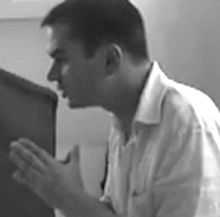Ray Brassier
 | |
| Born | 1965 |
|---|---|
| Nationality | British |
| Era | Contemporary philosophy |
| Region | Western philosophy |
| School | Speculative Realism |
| Main interests | Nihilism, Realism, Materialism, Methodological naturalism, Transcendental nihilism, Antihumanism |
| Notable ideas |
Philosophy as the 'organon of extinction.'[1] Thinking has interests that do not coincide with those of living; indeed, they can and have been pitted against the latter.'[2] |
|
Influenced
| |
Ray Brassier (born 1965) is a member of the philosophy faculty at the American University of Beirut, Lebanon, known for his work in philosophical realism. He was formerly Research Fellow at the Centre for Research in Modern European Philosophy at Middlesex University, London, England.
He is the author of Nihil Unbound: Enlightenment and Extinction and the translator of Alain Badiou's Saint Paul: The Foundation of Universalism and Theoretical Writings and Quentin Meillassoux's After Finitude: An Essay on the Necessity of Contingency. He is currently working on a book tentatively entitled That Which is Not.[3]
He first attained prominence as a leading authority on the works of François Laruelle. Brassier is of mixed French-Scottish ancestry, and his family name is pronounced in the French manner.
Work
Along with Quentin Meillassoux, Graham Harman, and Iain Hamilton Grant, Brassier is one of the foremost philosophers of contemporary Speculative Realism interested in providing a robust defense of philosophical realism in the wake of the challenges posed to it by post-Kantian critical idealism, phenomenology, post-modernism, deconstruction, or, more broadly speaking, "correlationism". Brassier is generally credited with coining the term "speculative realism," though Meillassoux had earlier used the phrase "speculative materialism" (matérialisme spéculatif) to refer to his own position.
Brassier himself, however, does not identify with the speculative realist movement, and, further, debates that there even is such a movement, stating "The ‘speculative realist movement’ exists only in the imaginations of a group of bloggers promoting an agenda for which I have no sympathy whatsoever: actor-network theory spiced with pan-psychist metaphysics and morsels of process philosophy. I don’t believe the internet is an appropriate medium for serious philosophical debate; nor do I believe it is acceptable to try to concoct a philosophical movement online by using blogs to exploit the misguided enthusiasm of impressionable graduate students. I agree with Deleuze’s remark that ultimately the most basic task of philosophy is to impede stupidity, so I see little philosophical merit in a ‘movement’ whose most signal achievement thus far is to have generated an online orgy of stupidity."[4]
Brassier is strongly critical of much of contemporary philosophy for what he regards as its attempt "to stave off the 'threat' of nihilism by safeguarding the experience of meaning — characterized as the defining feature of human existence — from the Enlightenment logic of disenchantment". According to Brassier, this tendency is exemplified above all by philosophers strongly influenced by Heidegger and Wittgenstein. Unlike more mainstream philosophers such as John McDowell, who would press philosophy into service in an attempt to bring about a "re-enchantment of the world", Brassier's work aims to "push nihilism to its ultimate conclusion".
According to Brassier, "the disenchantment of the world understood as a consequence of the process whereby the Enlightenment shattered the 'great chain of being' and defaced the 'book of the world' is a necessary consequence of the coruscating potency of reason, and hence an invigorating vector of intellectual discovery, rather than a calamitous diminishment".[2] "Philosophy", exhorts Brassier, "would do well to desist from issuing any further injunctions about the need to re-establish the meaningfulness of existence, the purposefulness of life, or mend the shattered concord between man and nature. It should strive to be more than a sop to the pathetic twinge of human self-esteem. Nihilism is not an existential quandary but a speculative opportunity."[2]
Brassier's work attempts to fuse elements of post-war French philosophy with ideas arising from the (largely Anglo-American) traditions of philosophical naturalism, cognitive science, and neurophilosophy. Thus, along with French philosophers such as François Laruelle, Alain Badiou, and Quentin Meillassoux, he is also heavily influenced by the likes of Paul Churchland, Thomas Metzinger and Stephen Jay Gould. He also draws heavily, albeit often negatively, on the work of Gilles Deleuze, Edmund Husserl, and Martin Heidegger.
Bibliography
- Original works
- Nihil Unbound: Enlightenment and Extinction (London: Palgrave Macmillan, 2007)
- As Translator
- Alain Badiou, Saint Paul: The Foundation of Universalism, transl. by Ray Brassier (Stanford: Stanford University Press, 2003).
- Alain Badiou, Theoretical Writings, transl. by Ray Brassier & Alberto Toscano (New York: Continuum, 2004).
- Jean-Luc Nancy, "Philosophy without Conditions," transl. by Ray Brassier, collected in Think Again: Alain Badiou and the Future of Philosophy, ed. Peter Hallward (Great Britain: MPG Books, 2004).
- Quentin Meillassoux, After Finitude: An Essay on the Necessity of Contingency, transl. by Ray Brassier (New York: Continuum, 2008).
See also
- François Laruelle
- Alain Badiou
- Graham Harman
- Quentin Meillassoux
- Paul Churchland
- Catherine Malabou
- Thomas Metzinger
- Philosophical realism
- Nihilism
- Non-philosophy
- Antihumanism
References
- ↑ Brassier, Nihil Unbound: Enlightenment and Extinction, p. 239
- ↑ 2.0 2.1 2.2 Brassier, Nihil Unbound: Enlightenment and Extinction, p. xi
- ↑ Niemoczynski, Leon. "Ray Brassier Interview with After Nature Blog". http://afterxnature.blogspot.ca/. Retrieved 11 November 2012.
- ↑ Ray Brassier interviewed by Marcin Rychter "I am a nihilist because I still believe in truth", Kronos, March 4, 2011
External links
- Review of Nihil Unbound in New Humanist
- Axiomatic Heresy: The Non-Philosophy of Francois Laruelle Radical Philosophy 121, Sep/Oct 2003. p. 25
- Webpage for Collapse journal featuring contributions by Ray Brassier and other "speculative realists"
- Interview with Ray Brassier
- Ray Brassier interviewed by Marcin Rychter "KRONOS"
- Catherine Malabou's talk It Does Not Have to Be Like This (On Meillassoux and Contingency) from the Forum for European Philosophy at Manchester Metropolitan University, September 2012 (MP3)
|